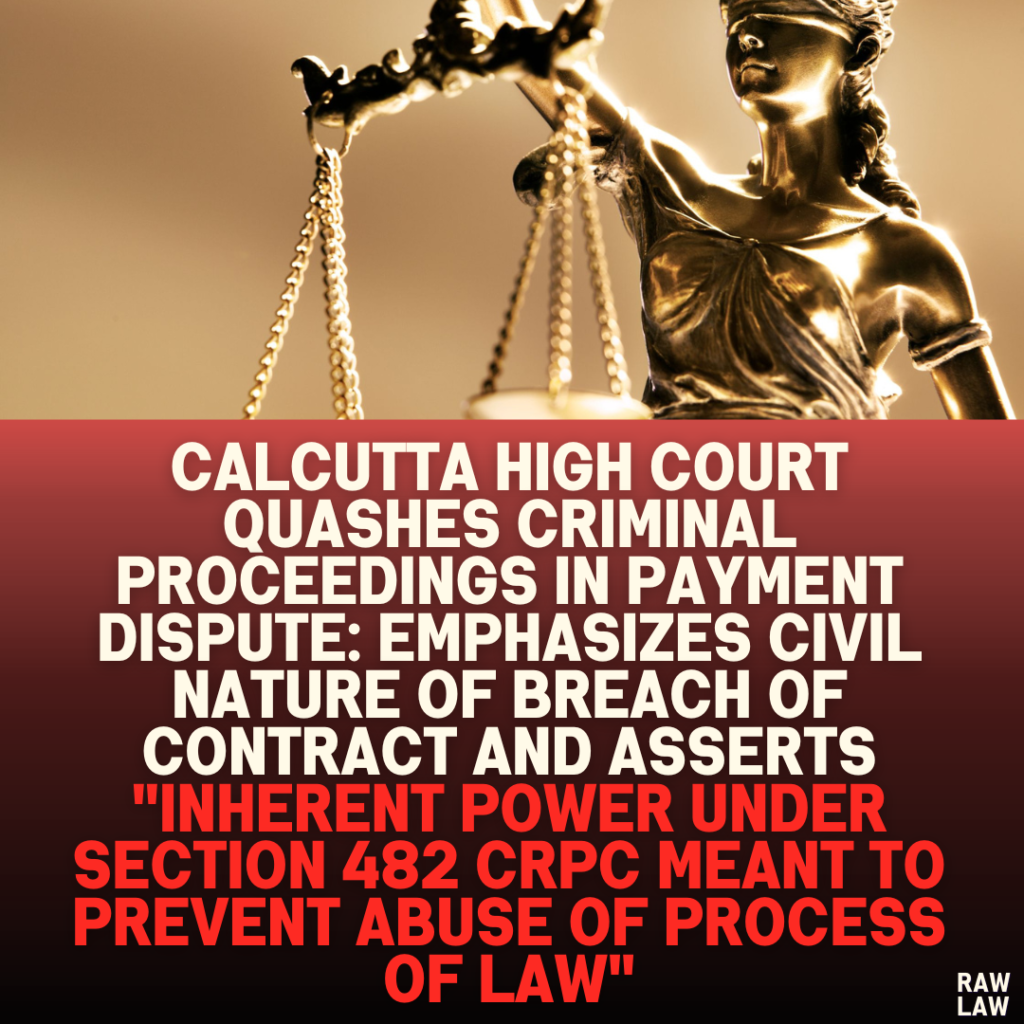1. Court’s Decision
The High Court allowed the petition filed by the accused and quashed the criminal proceedings under Sections 420, 506, and 34 of the Indian Penal Code (IPC). The court concluded that the matter stemmed from a breach of contract over payment for services rendered, which did not disclose any criminal offence. It observed:
“Inherent power under Section 482 CrPC is meant to prevent abuse of the process of law. Allowing the proceedings to continue would serve no purpose other than harassment.”
2. Facts
- The complainant was engaged by the petitioners through a written agreement to assist with land conversion and related legal processes.
- The agreement entitled the complainant to ₹80 lakhs for his services. However, he alleged that ₹65 lakhs remained unpaid, despite the completion of the work.
- The complainant claimed that he had advanced ₹15 lakhs on behalf of the petitioners and that the petitioners subsequently sold the converted property for ₹55 lakhs. Despite multiple reminders, the payment was not made, leading the complainant to file a criminal case.
- The petitioners sought to quash the criminal proceedings, arguing that the dispute was civil in nature.
3. Issues
- Civil vs. Criminal Nature of the Dispute: Does the alleged non-payment constitute a criminal offence or a civil breach of contract?
- Abuse of Process: Do the proceedings amount to an abuse of the criminal justice system?
4. Petitioner’s Arguments
The petitioners argued:
- The dispute was purely civil, arising from an alleged breach of contract.
- Non-payment of money did not amount to cheating (Section 420 IPC) as there was no fraudulent or dishonest intention at the inception of the contract.
- The complainant’s allegations of threats (Section 506 IPC) were vague and lacked specific details.
- Criminal proceedings were initiated with the intent to pressurize them into paying money.
5. Respondent’s Arguments
The respondent (complainant) contended:
- The petitioners failed to honor their contractual obligation to pay ₹65 lakhs.
- Threats were made by the petitioners, which justified criminal charges under Section 506 IPC.
- The proceedings should continue as the complainant had been wronged.
6. Analysis of the Law
The court analyzed the scope of its powers under Section 482 of the Criminal Procedure Code (CrPC) and reiterated established legal principles:
- Criminal and Civil Distinction: Not all breaches of contract amount to a criminal offence. To invoke criminal law, there must be evidence of dishonest or fraudulent intent at the inception of the agreement.
- Section 420 IPC (Cheating): Requires deception and fraudulent inducement. A mere breach of contract does not meet these requirements.
- Section 506 IPC (Criminal Intimidation): Allegations of threats must be specific and substantiated. Vague claims cannot form the basis for criminal charges.
7. Precedent Analysis
The court referred to several judgments, including:
- State of Haryana v. Bhajan Lal (1992): Enumerated instances where criminal proceedings could be quashed, particularly if the allegations do not disclose a cognizable offence or constitute an abuse of process.
- V.Y. Jose v. State of Gujarat (2009): Held that breach of contract per se does not amount to cheating unless fraudulent intent existed at the inception.
- Paramjeet Batra v. State of Uttarakhand (2013): Reiterated that civil disputes should not be cloaked as criminal offences.
- Mohammed Ibrahim v. State of Bihar: Highlighted the essential ingredients for the offence of cheating under Section 420 IPC.
- Neeharika Infrastructure Pvt. Ltd. v. State of Maharashtra (2021): Emphasized that judicial process should not be used for harassment or ulterior motives.
8. Court’s Reasoning
- The court found that the allegations were primarily about non-payment for services rendered, making it a civil dispute.
- The complaint lacked evidence of fraudulent or dishonest intent at the inception of the agreement, which is a prerequisite for the offence of cheating under Section 420 IPC.
- The allegations of threats under Section 506 IPC were vague, with no specific details about the time, place, or nature of the threats.
- The court observed: “Judicial process is a solemn proceeding which cannot be allowed to be converted into an instrument of operation or harassment.”
9. Conclusion
The High Court quashed the criminal proceedings, concluding that:
- The dispute was essentially civil in nature.
- Continuing the criminal case would amount to an abuse of the process of law.
- The complainant had the option to pursue civil remedies for recovering the alleged dues.
10. Implications
This judgment reinforces the principle that:
- Criminal law should not be used as a tool to recover money or settle civil disputes.
- High Courts have the inherent power under Section 482 CrPC to prevent abuse of process and protect individuals from unnecessary harassment.
- Litigants must clearly distinguish between civil and criminal claims when initiating legal proceedings.
